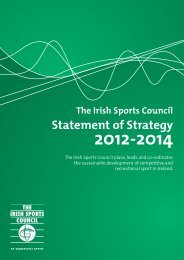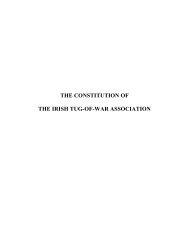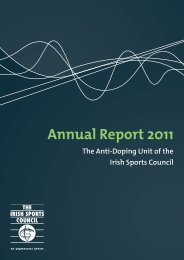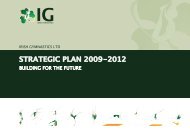Strategic Planning Guidelines - The Irish Sports Council
Strategic Planning Guidelines - The Irish Sports Council
Strategic Planning Guidelines - The Irish Sports Council
Create successful ePaper yourself
Turn your PDF publications into a flip-book with our unique Google optimized e-Paper software.
partners and to make use of available support services. Review:<br />
• Opportunities for the NGB to work effectively with partners<br />
• <strong>The</strong> NGB’s potential in getting and keeping sponsors for its programmes, bearing in<br />
mind that a range of tried and tested programmes will be available from the <strong>Irish</strong><br />
<strong>Sports</strong> <strong>Council</strong><br />
Image and Communications<br />
Sport is competing with many other activities for participants and so effective public<br />
relations are essential. Review:<br />
• <strong>The</strong> image of sport nationwide<br />
• Marketing and promotion of programmes<br />
Administration and Use of Information Technology<br />
Information technology should have had a significant impact on the way NGBs operate in<br />
ways ranging from the use of simple mailing lists to desktop publishing and e-mail. As<br />
many people interested in the work of the NGB will be able to access the internet either at<br />
home or work, it may be possible to be more effective by using e-mail. <strong>The</strong>re may also<br />
be other ways in which administrative procedures could be streamlined such as availing<br />
of shared services provided by the <strong>Irish</strong> <strong>Sports</strong> <strong>Council</strong>.<br />
Finance<br />
<strong>The</strong> easiest, most common and by far the worst way to produce a budget is to take last<br />
year’s income and expenditure figures and add a percentage for inflation. Such an<br />
approach stifles change. As organisations with limited financial resources of their own,<br />
NGBs need to use money as effectively as possible. It will help to split expenditure into<br />
“pay” (including PRSI contributions) and “non-pay” costs such as training courses, travel<br />
and subsistence, postage and telecommunications, printing and office supplies,<br />
merchandise costs, office premises, consultancy/legal/audit services, insurance and<br />
incidental expenses.<br />
20

















